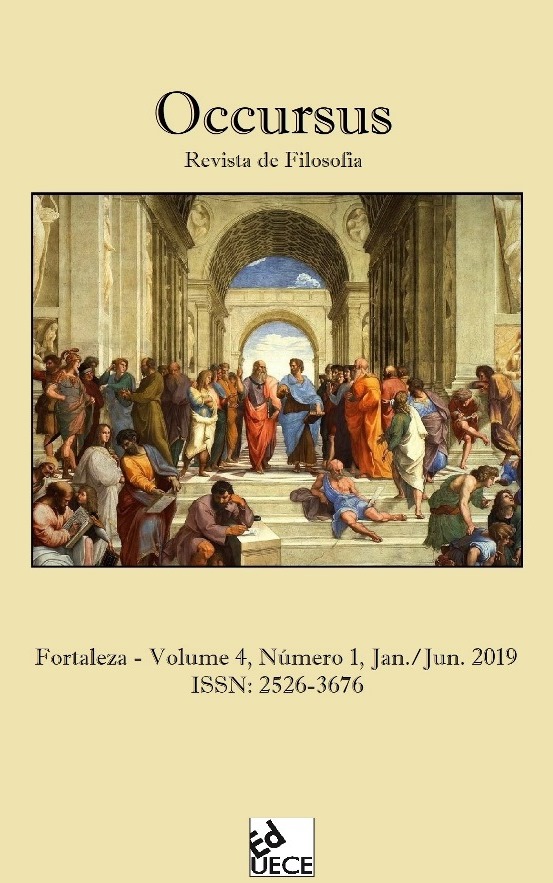Tecnologia, trabalho e revolução: estudo sobre o progresso tecnológico no mundo do trabalho, a partir de Herbert Marcuse
Palavras-chave:
Mecanização do trabalho. Assimilação e integração das classes antagônicas. Despersonalização da dominação.Resumo
O artigo tem como objetivo apresentar, segundo o pensamento de Herbert Marcuse, algumas implicações sociais do desenvolvimento tecnológico no processo social de produção das sociedades industriais avançadas. Como referência principal utilizamos o segundo capítulo do livro O homem unidimensional intitulado de “O fechamento do universo político”. O problema que esta pesquisa levanta é o seguinte: quais foram algumas das implicações sociais do progresso tecnológico no modo de produção das sociedades industriais avançadas? O resultado dessa pesquisa é que algumas das implicações sociais do aperfeiçoamento tecnológico no modo de produção das sociedades industriais avançadas foram 1) a mecanização do trabalho; 2) a assimilação e integração das classes antagônicas e 3) a despersonalização da dominação. A conclusão a que se chega é que o surgimento dessas relações sociais contribuiu para integrar a classe trabalhadora à sociedade estabelecida.
Referências
GADANHA, A. D. “Subjetividade, dissociação não presumida na compreensão dialética de Marcuse”. Kalagatos – Revista de Filosofia. Fortaleza, v. 6, n. 12, 2009, pp. 11-20. Disponível em: http://www.kalagatos.com.br/index.php/kalagatos/issue/view/18 Acesso em: 03 ago. 2017.
LENIN, V. I. O Estado e a revolução: o que ensina o marxismo sobre o Estado e o papel do proletariado na revolução. Tradução de Aristides Lobo. 2. ed. São Paulo: Expressão Popular, 2010.
MARCUSE, Herbert. Eros e civilização: uma interpretação filosófica do pensamento de Freud. Tradução de Álvaro Cabral. 8. ed. [Reimpr]. Rio de Janeiro: LTC, 2015a.
MARCUSE, Herbert. O homem unidimensional: estudos da ideologia da sociedade industrial avançada. Tradução de Robespierre de Oliveira, Deborah Christina Antunes e Rafael Cordeiro Silva. São Paulo: Edipro, 2015b.
MARCUSE, Herbert. Prefacio a la edición francesa. In: _______. El hombre unidimensional: ensayo sobre la ideología de la sociedad industrial avanzada. Traducción del Antonio Elorza. Barcelona: Planeta-De Agostini, 1993.
MARX, Karl. Crítica da filosofia do direito de Hegel – Introdução. In: _______. Crítica da filosofia do direito de Hegel, 1843. Tradução de Rubens Enderle e Leonardo de Deus. 3. ed. São Paulo: Boitempo, 2013.
MARX, Karl. Crítica do programa de Gotha. Tradução de Rubens Enderle. São Paulo: Boitempo, 2012.
PISANI, M. M. A “máquina” como instrumento de controle na sociedade tecnológica – Herbert Marcuse crítico da tecnologia. In: Congresso Internacional Indústria Cultural Hoje. 1, 2006, Piracicaba, Anais, Piracicaba, p. 1-14.
LIMA, Renê Ivo da Silva. Alternativas de superação da sociedade unidimensional em Herbert Marcuse: um estudo sobre o homem unidimensional. 2018. 55 f. Trabalho de Conclusão de Curso (Graduação em Filosofia) – Centro de Humanidades, Universidade Estadual do Ceará, Fortaleza, 2017.2 CD-ROM.
SILVA, R. C. Tecnologia e progresso: dois pontos de vista da teoria crítica. Pensando – Revista de Filosofia. Piauí, v. 4, n. 7, 2013, pp. 55-69. Disponível em:
http://www.ojs.ufpi.br/index.php/pensando/article/view/1447/1072 Acesso em: 23 jul. 2017.
Downloads
Publicado
Como Citar
Edição
Seção
Licença
Copyright (c) 2024 Renê Ivo da Silva Lima

Este trabalho está licenciado sob uma licença Creative Commons Attribution 4.0 International License.




